

Mantseke Thiti
Hello, My name is Mantseke Thiti. I'm am Early Childhood Educator and a lifelong learner. I've been teaching for the past 3 years and have enjoyed being around children, imparting my knowledge and being part of their little big world.
The Power of Evening Routines. The word “structure” can evoke less than positive associations. It suggests constraints, which are never a good thing, right? Wrong. It turns out that everyone benefits from a certain amount of daily structure, so long as that structure is pleasant, productive, and meaningful. Whether it’s the most inventive minds in history, or those people who live in good health past 100, a daily routine or set of micro-routines is correlated with productivity, health, and longevity. How do you speak 'Motherese'? News BBC News Navigation Sections Previous Next Media player. The Woman Who Changed Her Brain: Barbara Arrowsmith-Young at TEDxToronto.
How baby brains develop. Early childhood development – it’s not rocket science, it’s neuroscience! I was introduced to Mine Conkbayir when she contacted me about neuroscience informing early years practice, which I think is such an exciting, and growing, area of study.
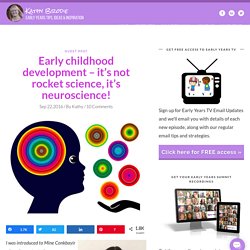
So I was very enthusiastic when she offered to do a guest post on this subject. Here she discusses how neuroscience can add another dimension to our understanding of child development: Like many individuals in this increasingly frantic world, I’m often busy juggling my responsibilities as a parent while I work and continue my studies – a very exciting journey as I try to achieve my PhD in early childhood education and neuroscience. Having been a lecturer across a range of child care and education qualifications for the past 14 years, I continue to be bewildered by the lack of consistently embedded teaching of neuroscience and early brain development across these qualifications. Being Multilingual: (Non-)native common ground. Suppose you get an email where your correspondent wrote: Additional documentation can be download from this site.
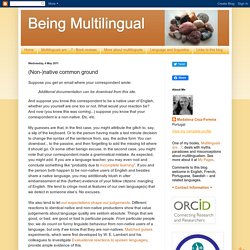
Being Multilingual: You speak with an accent. I don’t. Accents are things that only other people have. They are, by extension, things that you don’t want to have. Accents are, in short, shortcomings. This is why, if someone tells you that “you speak with no accent”, you can be sure of two things: that you have received words of praise indeed; and that you speak with the same accent as that person. So the person is actually not only praising her own accent, she is also giving evidence that she has no idea she’s got one. We seldom hear people say “We speak with an accent” or “I speak with an accent” – unless we’re talking about our uses of foreign languages. So let’s check out your accent. This is (choose the nearest answer – I was going to say “the best answer”, but I suddenly remembered that “best” has prescriptive connotations):
Being Multilingual: The natives and the speakers. Let me start with the good news.
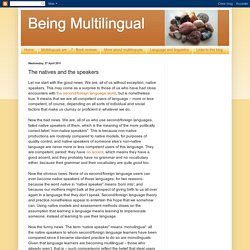
We are, all of us without exception, native speakers. This may come as a surprise to those of us who have had close encounters with the second/foreign language world, but is nonetheless true. Being Multilingual: You speak with an accent. I don’t. Listen to Your Mother. Young children face a remarkable challenge in learning to use the language of their culture. Toddlers vary widely, however, in the rate at which they learn new words.1 A team of Harvard Graduate School of Education researchers set out to ask whether and how children's language environment can impact vocabulary development. In their study of mother-child pairs from low-income families, they found that mothers who used many different words (not just many words) had toddlers with faster growth in vocabulary use.
Let's Talk. What do babies need in order to learn and thrive? One thing they need is conversation — responsive, back-and-forth communication with their parents and caregivers. This interactive engagement is like food for their developing brains, nurturing language acquisition, early literacy, school readiness, and social and emotional well-being. A dispiriting number of children don’t get that kind of brain-fueling communication, research suggests.
In early childhood policy (and in the wider media), much attention has been paid to the so-called word gap — findings that show that low-income children hear 30 million fewer words, on average, and have less than half the vocabulary of upper-income peers by age three. Why does my toddler love repetition? Paediatric speech and language therapist It may test your patience when your toddler demands 'Row, row, row your boat' for the 10th time.
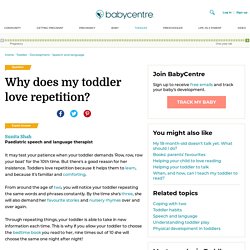
But there's a good reason for her insistence. Toddlers love repetition because it helps them to learn, and because it's familiar and comforting. From around the age of two, you will notice your toddler repeating the same words and phrases constantly. By the time she's three, she will also demand her favourite stories and nursery rhymes over and over again. Through repeating things, your toddler is able to take in new information each time. How can I help my child to start talking? (Video) Health visitor Sara Patience describes how you can help develop your child's language skills by talking and playing with her.
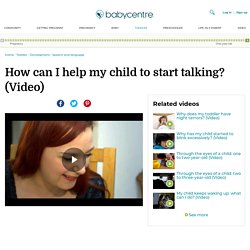
Multilingual Preschoolers. It’s amazing how young children learn to converse with others. They have to not only internalize grammar and vocabulary, but also develop an understanding of culture: how to take turns in a conversation, who to talk to, and how to narrate a story. For dual language learners (DLLs) — children under the age of 5 with a home language other than English — that process can be complex.
These young children must constantly navigate between two languages and cultures, while learning the rules of both. And while the benefits of multilingualism are clear, these learners they may be excluded or teased because of their differences, which can hinder their development. As linguistic diversity skyrockets worldwide, early childhood educators need to be prepared to help DLL students meet and overcome these unique challenges. The Diversity of Languages in Early Education. Multilingual Preschoolers.